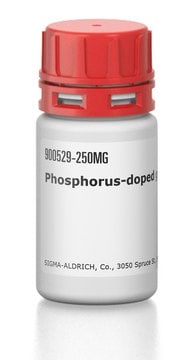264032
Indium
powder, −100 mesh, 99.99% trace metals basis
Synonym(s):
Indium element
About This Item
Recommended Products
vapor pressure
<0.01 mmHg ( 25 °C)
Quality Level
Assay
99.99% trace metals basis
form
powder
resistivity
8.37 μΩ-cm
particle size
−100 mesh
mp
156.6 °C (lit.)
density
7.3 g/mL at 25 °C (lit.)
SMILES string
[In]
InChI
1S/In
InChI key
APFVFJFRJDLVQX-UHFFFAOYSA-N
Looking for similar products? Visit Product Comparison Guide
General description
Application
- Indium-containing semiconductors: Discusses the role of indium in semiconductor technology, relevant for both academia and material science, focusing on its application in indium-tin oxide and other indium compounds (Schwarz‐Schampera, 2014).
- Recovery of indium from liquid crystal displays: This article presents methods for the recovery of indium from waste electronics, an area of significant interest for sustainable chemistry and materials science (Rocchetti et al., 2016).
- The oxidation and surface speciation of indium and indium oxides exposed to atmospheric oxidants: Explores the chemical properties and reactions of indium in various oxidation states, relevant to environmental and materials chemistry (Detweiler et al., 2016).
Signal Word
Danger
Hazard Statements
Precautionary Statements
Hazard Classifications
Acute Tox. 4 Inhalation - Eye Irrit. 2 - Flam. Sol. 1 - Skin Irrit. 2 - STOT SE 3
Target Organs
Respiratory system
Storage Class Code
4.1B - Flammable solid hazardous materials
WGK
WGK 3
Personal Protective Equipment
Choose from one of the most recent versions:
Already Own This Product?
Find documentation for the products that you have recently purchased in the Document Library.
Customers Also Viewed
Articles
Solid state and materials chemistry have made a tremendous impact and have experienced growth in recent years, particularly for rare earthcontaining materials.
Our team of scientists has experience in all areas of research including Life Science, Material Science, Chemical Synthesis, Chromatography, Analytical and many others.
Contact Technical Service









